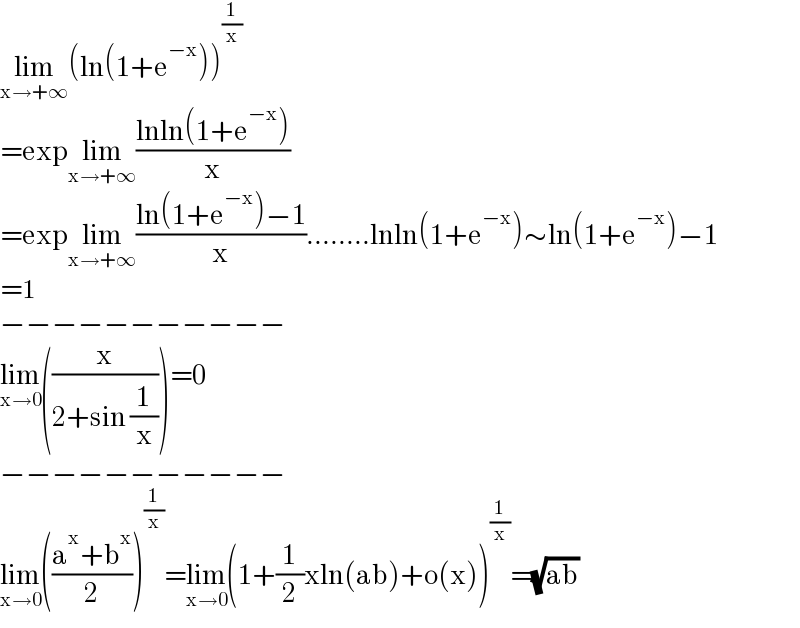
Question Number 161156 by LEKOUMA last updated on 13/Dec/21

$${Calculate} \\ $$$$\underset{{x}\rightarrow+\infty} {\mathrm{lim}}\left(\mathrm{ln}\:\left(\mathrm{1}+{e}^{−{x}} \right)\right)^{\frac{\mathrm{1}}{{x}}} \\ $$$$\underset{{x}\rightarrow\mathrm{0}} {\mathrm{lim}}\left(\frac{{x}}{\mathrm{2}+\mathrm{sin}\:\frac{\mathrm{1}}{{x}}}\right) \\ $$$$\underset{{x}\rightarrow\mathrm{0}} {\mathrm{lim}}\left(\frac{{a}^{{x}} +{b}^{{x}} }{\mathrm{2}}\right)^{\frac{\mathrm{1}}{{x}}} \\ $$
Answered by qaz last updated on 13/Dec/21

$$\underset{\mathrm{x}\rightarrow+\infty} {\mathrm{lim}}\left(\mathrm{ln}\left(\mathrm{1}+\mathrm{e}^{−\mathrm{x}} \right)\right)^{\frac{\mathrm{1}}{\mathrm{x}}} \\ $$$$=\mathrm{exp}\underset{\mathrm{x}\rightarrow+\infty} {\mathrm{lim}}\frac{\mathrm{lnln}\left(\mathrm{1}+\mathrm{e}^{−\mathrm{x}} \right)}{\mathrm{x}} \\ $$$$=\mathrm{exp}\underset{\mathrm{x}\rightarrow+\infty} {\mathrm{lim}}\frac{\mathrm{ln}\left(\mathrm{1}+\mathrm{e}^{−\mathrm{x}} \right)−\mathrm{1}}{\mathrm{x}}........\mathrm{lnln}\left(\mathrm{1}+\mathrm{e}^{−\mathrm{x}} \right)\sim\mathrm{ln}\left(\mathrm{1}+\mathrm{e}^{−\mathrm{x}} \right)−\mathrm{1} \\ $$$$=\mathrm{1} \\ $$$$−−−−−−−−−−− \\ $$$$\underset{\mathrm{x}\rightarrow\mathrm{0}} {\mathrm{lim}}\left(\frac{\mathrm{x}}{\mathrm{2}+\mathrm{sin}\:\frac{\mathrm{1}}{\mathrm{x}}}\right)=\mathrm{0} \\ $$$$−−−−−−−−−−− \\ $$$$\underset{\mathrm{x}\rightarrow\mathrm{0}} {\mathrm{lim}}\left(\frac{\mathrm{a}^{\mathrm{x}} +\mathrm{b}^{\mathrm{x}} }{\mathrm{2}}\right)^{\frac{\mathrm{1}}{\mathrm{x}}} =\underset{\mathrm{x}\rightarrow\mathrm{0}} {\mathrm{lim}}\left(\mathrm{1}+\frac{\mathrm{1}}{\mathrm{2}}\mathrm{xln}\left(\mathrm{ab}\right)+\mathrm{o}\left(\mathrm{x}\right)\right)^{\frac{\mathrm{1}}{\mathrm{x}}} =\sqrt{\mathrm{ab}} \\ $$
Commented by stelor last updated on 14/Dec/21
please, I don't understand the third line , please explain me again.
Commented by stelor last updated on 14/Dec/21
third of first limit.
Commented by qaz last updated on 15/Dec/21

$$\mathrm{this}\:\mathrm{is}\:\mathrm{infinitesimal}\:\mathrm{equivalent}\:\mathrm{substitution}. \\ $$$$\underset{\mathrm{x}\rightarrow\mathrm{0}} {\mathrm{lim}}\frac{\mathrm{ln}\left(\mathrm{1}+\mathrm{x}\right)}{\mathrm{x}}=\mathrm{1}\:\:\Rightarrow\:\:\mathrm{ln}\left(\mathrm{1}+\mathrm{x}\right)\sim\mathrm{x}\:\:\Rightarrow\:\:\mathrm{lnx}\sim\mathrm{x}−\mathrm{1} \\ $$
